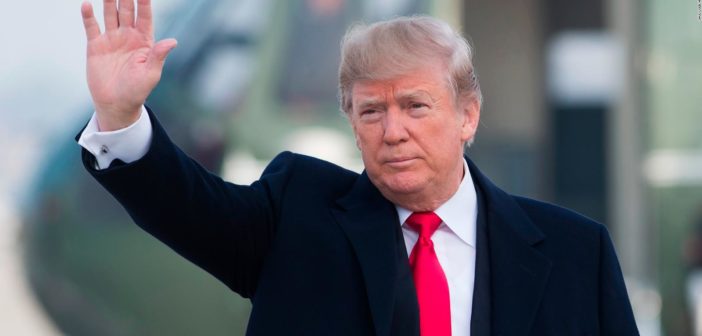
President Trump’s decision to withdraw U.S. troops from Syria seems to have surprised even shocked many, particularly in Washington. His brief announcement left many questions unanswered. Had he been a consistent leader steering his administration in close consultation with a steady team of senior officials, explaining the rational of his policies using conventional methods instead of tweets, maintaining close consultation/cooperation with allies, the reaction could have been different.
In response to criticism, he tweeted: “Getting out of Syria was no surprise. I’ve been campaigning on it for years…”
He was not the only one. This is precisely why David E. Sanger’s New York Times article of December 19 carried the title, “A Strategy of Retreat in Syria, With Echoes of Obama”, whom Mr. Trump has constantly reviled.
On October 22, 2002 Illinois Senator Barack Obama said, “I know that even a successful war against Iraq will require a US occupation of undetermined length, at undetermined cost, with undetermined consequences. I know that an invasion of Iraq without a clear rationale and without strong international support will only fan the flames of the Middle East, and encourage the worst, rather than best, impulses of the Arab world, and strengthen the recruitment arm of al-Qaeda…”
As he had predicted, the Islamic State emerged as an al-Qaeda splinter group a decade ago in Iraq. At the time, its potential was hardly known, at least to the public. Nonetheless, there were those who foresaw the growing danger. For example, Sir Malcolm Rifkind – a former U.K. foreign secretary and defense secretary – told the Financial Times in August 2014 that the US and its allies must be prepared to work with the Syrian regime of Bashar al-Assad to have any hope of defeating ISIS. But for others, Assad was the archenemy and the Ukraine conflict didn’t help. Thus, ISIS became a global threat, extending its reach in all directions.
Eleven years later, in his address to the UN General Assembly on September 24, 2013 President Obama said, “I know there are those who have been frustrated by our unwillingness to use our military might to depose Assad, and I believe that a failure to do so indicates a weakening of America’s resolve in the region… the United States is chastised for meddling in the region, and accused of having a hand in all manner of conspiracy; at the same time, the United States is blamed for failing to de enough to solve the region’s problems, and for showing indifference toward suffering Muslim populations…”
Indeed, during the last century, brief external military interventions aside, the US has gone to war seven times. These are the First and Second World Wars, the wars in Korea and Vietnam, the two Gulf wars and the war in Afghanistan. The intervention in Afghanistan has outlasted the Vietnam war. The war in Iraq lasted nine years.
Mr. Obama was right about Iraq and honest to admit the failure of the Libya intervention. Despite earlier promises, he was unable to withdraw U.S. troops from Afghanistan before leaving the White House. Although Afghanistan is a special case, history has shown that external military interventions do not serve the twin purposes of nation-building and promoting democracy. They don’t bring stability.
Last week, Special Presidential Envoy for Global Coalition to Defeat ISIS, Mr. McGurk reportedly characterized the mission in Syria as one that sought the “enduring defeat” of the Islamic State. “We know that once the physical space is defeated, we can’t just pick up and leave,” he told reporters. “We want to stay on the ground and make sure that stability can be maintained in these areas.”
One may ask, like the “enduring defeat” of the Taliban?
Stay on the ground only in these areas? What about the other countries of the broad Middle East where ISIS has taken root? Central Asia? Africa? What about Boko Haram?
Russia’s military intervention in Syria has been a game changer. It has shown that Russia remains an actor in the Middle East and has the hard power to make a difference on the ground in Syria. Russia is now trying to prove that it also has a peacemaking capacity. The peoples of the Middle East are desperate for some semblance of peace and stability and Syria offers Russia an opportunity. Thus, for Washington, cooperation with Russia in Syria could be a relatively low-cost way of handling a difficult situation. Would that represent an alarming decline in U.S.’ global standing? It may be perceived by some as loss of face. It may not conform to what President Obama called the “Washington playbook”. But it can be an investment in multilateralism which remains the key to addressing world’s challenges. After all, Syria had always been very close to Russia. As for Iran’s growing regional outreach, this is the price for a misguided, mishandled regime change project and the remedy is engagement.
Another problem is the abrupt announcement of the withdrawal. Hardly anything is known about the groundwork. Israel must have been consulted or informed, but which other allies were consulted? Or, were they consulted at all? What understandings were reached? Is this part of a broader deal or not? Did Russia have a clue of the decision? There are no answers. President Erdogan welcomed President Trump’s decision with a word of caution. He said operations into Syria were being delayed. This suggests that the decision was a surprise even for Turkey which had been pressing Washington for years to distance itself from the PYD/YPG.
In brief, under different circumstances this could represent a thoroughly thought-out policy shift and pave the way for the forming of a broader coalition to defeat ISIS since Syria will not be the end of the story. The failure to form a genuine international/multicultural coalition to tackle the problem in its multiple dimensions remains terrorists’ greatest source of strength.
Addressing the Russian Defense Ministry Board on Tuesday, President Putin said, “… The situation in Syria is gradually being stabilized after the rout of major groups of militants. However, these criminals are still trying to show their teeth. I would like to emphasize that this uncompromising struggle against the militants will continue. We will give Syrians all the support they need…”
There is no reason to question his sincerity because those “criminals” as he called them are even more of a threat to Russia’s security than the West.
It seems that this is going to be another period of suspense, uncertainty. Because, until the last American soldier leaves Syria the world will not know for sure if the decision wouldn’t be changed or modified. How Mr. Trump’s internal critics will continue to react also needs to be watched. Some of these critics are supporters of the President and their public disapproval of the withdrawal may also signal a change in their assessment of the President’s future.
Russia and Iran having turned the tide on the battlefield are now trying to move forward on the political track. Their vision of the endgame in Syria does not exactly correspond to that of Ankara, but Turkey has no other option than fully supporting Syria’s political transition if it is to end its Syria nightmare. Because, a “Turkey first” policy dictates the ending of the Syrian conflict and the return of the refugees. It goes without saying that a “Turkey first” policy in the beginning of Syria’s war would have been non-involvement except for the cause regional peace and stability.
The Turkish government would be well-advised to focus on contributing to peace in Syria without investing too much in Mr. Trump’s future and his policies. It will be well-advised to stop blaming President Obama for the downturn in relations. This is wrong and will not go well with the U.S. House of Representatives where Democrats are now the majority. Unless provoked, Ankara should refrain from cross-border operations and encourage all Syrian groups to seek common ground with Damascus. And, it should remain committed to the lasting defeat of ISIS.
………………………………………………………………………………………………………………..
Ali Tuygan, Ambassador (Ret’d) and former Undersecretary of the Turkish Foreign Ministry. The article is also published on his blog: https://diplomaticopinion.com/2018/12/22/trumps-decision-to-withdraw-from-syria/









